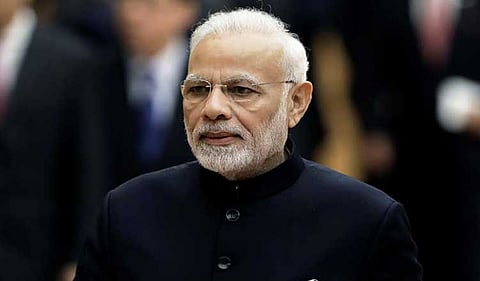
- Home
- Live Blog
- Breaking News
- Top Headlines
- Cities
- NE News
- Sentinel Media
- Sports
- Education
- Jobs

UNITED NATIONS: Prime Minister Narendra Modi has urged nations not to politicise anti-terrorism measures like the listing of militants for UN sanctions or imposing financial restrictions on countries involved in financing terrorism.
Prime Minister Modi also met with five world leaders on Monday on the sidelines of the General Assembly meeting to discuss bilateral cooperation with matters ranging from cricket to counter-terrorism cooperation. External Affairs Ministry Spokesperson Raveesh Kumar said that the focus during the meetings that Modi and External Affairs Minister S. Jaishankar had with world leaders was on bilateral matters and cooperation and not on issues with any particular country.
On Modi’’s participation in the Leaders’’ Dialogue on Strategic Responses to Terrorist and Violent Extremist Narratives, External Affairs Ministry Secretary (West) Gitesh Sarma said on Monday that the Prime Minister told the group that “we need to avoid politicization of mechanisms like UN listings” that puts terrorists under sanctions and the Financial Action Task Force (FATF), which monitors terrorist financing to effectively fight terrorism.
The request was directed at China — even though he did not name it — because it had opposed for about a decade the listing Jaish-e-Mohammed (JeM) chief Azhar Masood as an international terrorist by the UN Security Council.
Under international pressure, it dropped the veto in May.
Speaking at the Council for Foreign Relations on Monday, Pakistan Prime Minister Imran Khan accused India of trying to “bankrupt” it by pursuing actions against it by the FATF.
Modi told the meeting that the world should come together to fight terrorism like it has to combat climate change.
Sarma said that Modi’’s message at the meeting was “terrorism is a global issue and let us all work together. Let us not get into political ways to look at terrorism”.
At Modi’s meeting with Maldives President Ibrahim Solih drawing the archipelago into the cricket-crazy South Asian fold came up. External Affairs Ministry Spokesperson Raveesh Kumar said that cooperation in building up cricket was discussed and Maldivian cricketers were soon to be trained in India. A proposal for a cricket stadium in the Maldives is to be taken up for consideration by India, he said. The leaders, of course, also discussed cooperating in developing the Maldives.
During his meeting with Modi, the Amir of Qatar, Tamim Bin Hamad Al Thani, expressed gratitude for the work done by the Indian diaspora to develop his country, Kumar said. Modi discussed cooperating in counter-terrorism, he added.
Narendra Modi made a pitch for “Make in India” to Italian Prime Minister Giuseppe Conte, he said. Italian companies could take advantage of the lower labour costs by investing in India, he said. Some talk of defence cooperation also came up, he said.
Niger President Issoufou Mahamadou asked Modi for cooperation in developing solar power and agriculture, Kumar said. India is giving Niger $35 million for building the Mahatma Gandhi Convention Centre in its capital Niamey. They also discussed cooperation in counter-terrorism.
President Hage Geingob of Namibia thanked Modi for the assistance India had given the country when it was hit by a drought, Kumar said.
UNICEF chief Henrietta Ford also met Narendra Modi, who told her about the various programmes for child development in areas like nutrition and education that India was running.
The bilateral meetings were squeezed in during a day of three important meetings.
At the Climate Action Summit, where he pledged that India would raise its share of non-fossil fuel in its fuel mix and “increase by 2022 our renewable energy capacity to 175 gigawatts, and we are committed to further increasing this to 450 gigawatts.”
At the first UN General Assembly high-level meeting on universal health coverage, he outlined the many health initiatives in India, especially the Ayushman Bharat Yojana programme covering 100 million people, and urged depoliticisation of anti-terrorism measures at the Leaders’ Dialogue on Strategic Responses to Terrorist and Violent Extremist Narratives.
“India’s rising stature, both as a democracy and a major influential country came out in the three events,” said Sarma.
Foreign Minister S Jaishankar met foreign ministers from 10 countries, two of which — Turkey and Iran — have been critical of the Indian government action in Kashmir.
After his meeting with Iran’s Foreign Minister Javad Zarif, Jaishankar tweeted: “A very useful exchange of perspectives on regional developments. Agreed to stay in touch.”
India was forced by US sanctions to stop buying Iranian oil, while it has been able to continue with the Chabahar port that can be used for aid and trade with Afghanistan.
Following his meeting with Turkey’s Foreign Minister MevlutCavusoglu, Jaishankar tweeted, “Reviewed different dimensions of our bilateral relationship.”
He also met foreign ministers Angue Simeon of Equatorial Guinea, Sirojiddin Muhriddin of Tajikistan, Abdulaziz Khafizovich Kamilov of Uzbekistan, Stef Blok of the Netherlands, Ekaterina Zaharieva of Bulgaria, Karen Cummings of Guyana and Marcel Amon-Tanoh of Cote d’Ivoire.
Jaishankar also met with Zalmay Khalilazad, the US Special Representative for Afghan rconciliation, and tweeted afterwards that they had “an exchange of views on the latest situation in Afghanistan.”
Meanwhile, Minister of State for External Affairs attended the meeting of the Conference on Interaction and Confidence-Building Measures in Asia (CICA). Among the topics he spoke about there was jointly fighting terrorism.
Pakistan’s Foreign Minister Shah Mehmood Qureshi was also present. (IANS)